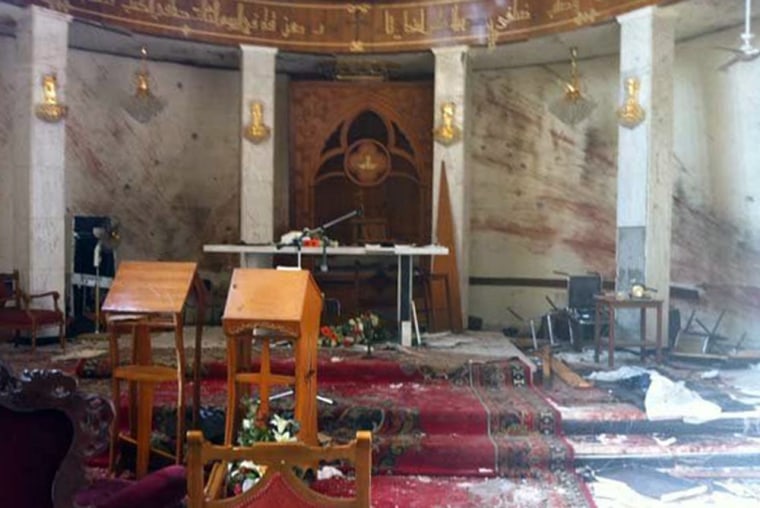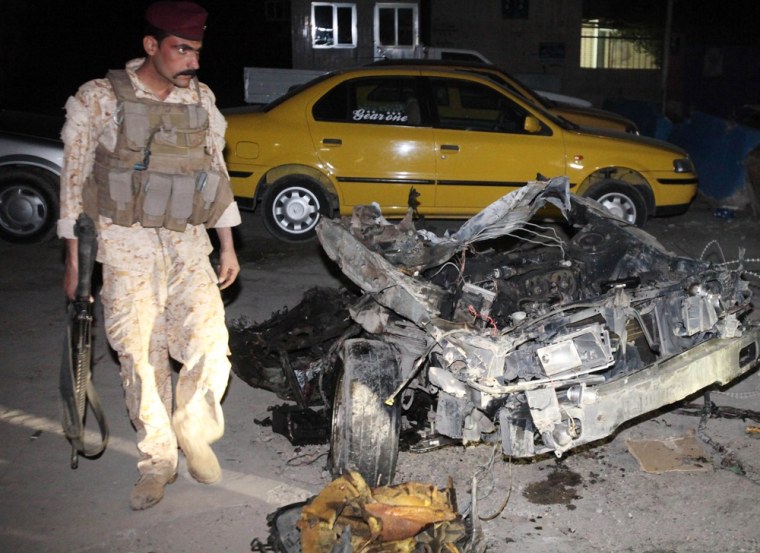Sixteen bombs went off across Iraq's capital on Tuesday, many at restaurants and coffee shops full of civilians. The death toll climbed to 76 in the first hours following the blasts, but that number could keep rising as rescuers comb through the debris.
"Ten cars exploded with bombs inside them. There were also four roadside bombs and two sticky bombs," said Baghdad security spokesman Maj. Gen. Qassim al-Moussawi.
The blasts happened in at least 10 neighborhoods. Nearly 300 people were hurt, officials said.
Al-Moussawi initially said the attacks were all in Shiite neighborhoods, but other officials later said some mixed areas were also hit.
The rapid-fire attacks called into question whether Iraqi security forces can protect the capital. They also came just two days after gunmen in Baghdad held a Christian congregation hostage in a siege that ended with 58 people dead.
"They murdered us today and on Sunday, they killed our brother, the Christians," said Hussein al-Saiedi, a 26-year-old resident of the Shiite slum of Sadr City where 21 people were killed in the most deadly incident of the day.
He said he was talking to friends on a busy street, when the blast occurred.
"We were just standing on the street when we heard a loud noise, and then saw smoke and pieces of cars, falling from the sky," he said. People were fleeing the site in panic, frantically calling the names of their relatives and friends. "They (the government) say the situation is under control. Where is their control?"
Adnan Anbar, a 42-year-old man who was crossing the street in Sadr City when the parked car blew up, questioned the effectiveness of the hundreds of police and army checkpoints scattered throughout Baghdad.
"What are all these checkpoints about?" Anbar asked. "Where is the government?"
Iraq remains in political limbo almost eight months after an inconclusive vote, raising fears that insurgents might exploit tension to try and reignite sectarian war. Tuesday's attack was the third major assault in Iraq since Friday.
There was no immediate claim of responsibility. But the coordination of the blasts, the complexity of the operation and the predominantly Shiite targets point to al-Qaida-linked Sunni insurgents. Iraq has been plagued by conflict between Shiite and Sunni Muslim sects since the 2003 collapse of Saddam Hussein's regime, which was dominated by the minority Sunnis. It was supplanted by a Shiite-dominated government that remains in power until today.
Earlier Tuesday, an Iraqi police commander was detained for questioning in connection with the deadly attack two days earlier on a Catholic church in the capital.
An Iraqi military spokesman said Prime Minister Nouri al-Maliki ordered the detention of the police commander, whom he did not identify by name. The commander was in charge of securing the Karradah neighborhood in Baghdad where Our Lady of Salvation is located.
Al-Moussawi said the assailants were disguised as guards working for a private security firm and carried fake IDs. "We have many question marks about how such a large number of terrorists managed to reach the church in the heart of Baghdad," he added.
Meanwhile, hundreds of grieving Christians and other Iraqis packed a funeral service for the dead in a sanctuary not far from the church where militants linked to al-Qaida killed 58 people and wounded nearly 80 in a shocking attack during a Sunday evening Mass.
Iraq's top Catholic prelate, Chaldean Cardinal Emmanuel III Delly, urged the government to protect the nation's Christian community and not let their promises just be ink on paper.

"We are gathered here in this sacred house to say farewell for our brothers who were just the day before yesterday exclaiming love and peace," Delly told a weeping congregation at the Chaldean St. Joseph church in central Baghdad. "Now fate has decided that they will leave us."
The attack was the worst in years on Iraq's already dwindling Christian community.
Vice President Adel Abdul-Mahdi said the assault was "very painful" for the stunned nation because "it harbors a sinister plan to empty the region of one of its main components: the Christians."
Violence has subsided significantly in Iraq since the height of sectarian bloodshed in 2006-07 but attacks by Sunni insurgents linked to al-Qaida and Shiite militia continue daily. On Friday, 22 people were killed when a suicide bomber attacked an Iraqi cafe northeast of Baghdad.
The surge in violence is raising fresh concerns about the planned pullout of American troops next year. The U.S. now has just under 50,000 troops in Iraq, down from a wartime high of 170,000.
A State Department audit concluded Tuesday that the Obama administration could be overstating what U.S. diplomats can do to contain Iraq's ethnic and sectarian tensions without U.S. military forces.
The auditors also questioned whether American diplomats who remain behind will be adequately protected against insurgent violence, and their report faulted Washington for its planning of the transition from a U.S. military-led mission in Iraq to one run by American civilians in 2011.
In its report, the State Department's office of inspector general said stability in Iraq may be years away. It warned that the failure of Iraqi political leaders to form a unity government has interfered with the "urgent task" of planning for Washington's post-2011 diplomatic role.
Stephen Biddle, an Iraq watcher at the Council on Foreign Relations, said it will be difficult for U.S. diplomats to keep a lid on Sunni-Shiite and Arab-Kurd rivalries in the absence of a sizable American military presence.
"Normally, stabilizing a situation like this requires peacekeepers," he said. "Peacekeepers are soldiers. That doesn't say there aren't important and valuable things that government civilians can do. But ... security protection is important in this environment, and that's not something State Department civilians do."
Iraq has been plagued by conflict between Shiite and Sunni Muslim sects since the 2003 collapse of Saddam Hussein's regime, which was dominated by the minority Sunnis. It was supplanted by a Shiite-dominated government that remains in power until today.
